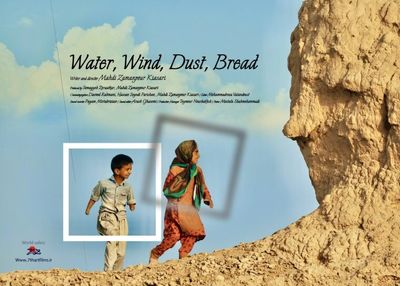“Makeup Artist” by Jafar Najafi, “Tonight’s Homework” by Ashkan Nejati and Mehran Nematollahi, “Water, Wind, Dust, Bread” by Mehdi Zamanpur Kiasari, and “I Am Trying to Remember” by Pegah Ahangarani will be screened in the different sections of the festival.
“Makeup Artist”, the winner of the Award of Excellence at the Yamagata International Documentary Film Festival in Japan, is about Mina, a makeup artist who is determined to realize her dreams. She not only refuses to succumb to her husband and mother-in-law’s fierce opposition, but also paves her own path and pushes forward along it. Gradually, it looks as if the people and world around her are starting to change.
“Tonight’s Homework” has been made based on Abbas Kiarostami’s 1989 “Homework”.
In “Homework”, Kiarostami put questions to students at a public school: questions about homework, punishments, and dreams of the future. The result was a portrait of the generation that grew up during the Iran-Iraq war, trapped by uncertainty and a rigid upbringing.
Now, some 30 years later, directors Nejati and Nematollahi repeat Kiarostami’s questions and come to the conclusion that the school system and society itself have changed dramatically. The gulf between rich and poor has grown far wider, and that has become evident in the schools. Parents, many of whom are illiterate, are unable to help their young ones, or otherwise too busy with their careers to supervise homework. Any sense of interest or guidance is absent.
Two now-adult subjects of Kiarostami’s film agree that there’s something fundamentally wrong with the way responsibilities get dumped on the shoulders of teachers. The only thing that’s unchanged is the way the children reply in the approved manner—yes, of course, they’ve done their homework.
“Water, Wind, Dust, Bread” tells the story of 11-year-old Abolfazl who lives with his family in an oasis in the Iranian desert. He picks dates, tends to his family’s cows, does his homework, and has fun with his best friend Setayesh.
The camera quietly observes their friendship as they swing between the date palms or climb the windswept rocks around the oasis. Abolfazl’s mother bakes fresh bread, and tourists come to her guesthouse for the serene atmosphere.
But life in the oasis is not entirely idyllic. Although Abolfazl lives with a physical disability, it is Setayesh who faces an even bigger hurdle. She is one of the 40,000 children in Iran who don’t have a birth certificate, and as a result, she can’t go to school.
In “I Am Trying to Remember”, Pegah talks about a man named Gholam, who is always present at her family gatherings. Gholam films these everyday scenes with his own camera. At the time, Pegah can’t imagine what the purpose of these films might be, but she’s happy to pose before the lens of this family friend, who she’s certainly very fond of.
It is as if Pegah, the film’s director and chief protagonist, is reading from a children’s book; as if we are looking over her shoulder at Gholam’s films of the family and the old photos. The large family radiates great warmth as we see them shoveling snow or just sitting around at home.
Source: Tehran Times

